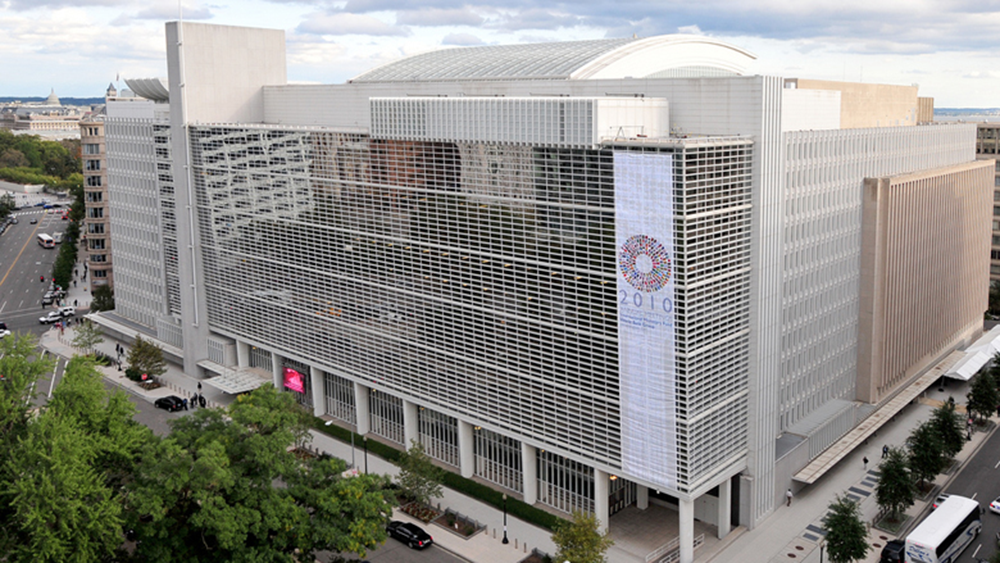Activists protested in a “Stop Financing Fossil Fuels” demonstration outside the World Bank and International Monetary Fund buildings on Oct. 18 to object against the organizations’ investments in fossil fuel energy.
The protest included about 50 people and was organized by The Big Shift Global campaign, a movement comprised of over 40 international sustainability-focused organizations, according to protest attendee and GU Fossil Free member Sadie Morris (SFS ’22).
The demonstration occurred during the World Bank’s and IMF’s annual Civil Society Policy Forum from Oct. 15 to Oct. 18, where members met to discuss the overall progress of the organizations on topics including sustainable development and climate change. The protest aimed to emphasize the need for the two organizations to invest in sustainable renewable energy rather than fossil fuels, according to the event’s Facebook page.
The demonstration, which began at Edward R. Murrow Park at the corner of H and 18th and proceeded past the World Bank, IFC and IMF buildings, shut down a portion of H Street, according to Morris. The protest featured six speakers from developing nations, who spoke out against the World Bank and IMF investing in non-sustainable, environmentally-harmful energy programs in their native countries, Morris said.

“There was a series of speakers from the global south, and the general theme was that they were looking for autonomy over their land,” Morris said. “They didn’t want these businesses coming in that were making decisions that were not good for their land. They didn’t want fossil fuels to be built into the loans and the programs that the World Bank or IMF is setting up in their countries.”
The protest stemmed from activists’ frustration with the World Bank’s history of funding fossil fuel initiatives in developing countries in Asia, Africa and South America, according to Morris.
The World Bank helped with financing or developmental policies of fossil fuel companies in over 45 countries from 2014 to 2018, according to research from environmental group Urgewald, which is cited in The Big Shift Global’s letter to the World Bank.
However, the Urgewald research does not highlight the changes made to energy financing over the years, according to a World Bank Group spokesperson.
“The Urgewald report is inaccurate in its claims about World Bank Group energy financing, and highly selective in the projects and investments it focuses on,” a spokesperson wrote in an email to The Hoya. “By focusing on all open projects in our energy portfolio, including legacy projects where financing was approved many years ago, the report does not reflect the substantial changes that have happened in our energy financing over the past decade.”
Investment in fossil fuels allows powerful organizations to brush off the responsibility of addressing timely environmental issues, according to Morris.
“Fossil fuels are not the future,” Morris said. “They are not a sustainable source of energy, so I think any kind of investment that’s made there is both a sign that we’re not really looking to the future and it’s not a sustainable decision for our decision-makers to be making for people and our planet.”
Among the roughly 50 people who participated in the protest, many were college students who are a part of the local chapter of the national organization the Sunrise Movement, which advocates for the Green New Deal, proposed legislation that aims to address climate change.
The balance between college students and seasoned environmental activists created an energized environment at the protest, according to Morris.
“Even though it was a smaller group, it was a group of people who are really invested in the issue and so there was a lot of energy and knowledge in the space,” Morris said. “The crowd of people was a good combination of younger college students and also people who are more involved in climate organizations in D.C. itself.”
This week’s protest had a tangible impact, as protestors grabbed the attention of both pedestrians and those who work at corporations like the IMF, according to Morris.
“You could actually see people pausing and taking notice. I thought that made it feel very productive, especially because the police let us stay so long outside the IMF in particular,” Morris said. “People were coming and going from meetings and they were stopping and watching.”
The “Stop Financing Fossil Fuels” protest showcases how the younger generation is motivated to address the climate crisis, and more specifically, the need to move away from fossil fuels, according to GUFF core member Juliette Leader (SFS ’20). These protests demonstrate to institutions that environmental issues are important and need to be addressed, Leader wrote. (Full disclosure: Leader is a former member of The Hoya’s editorial board).
“Student protests regarding the climate crisis broadly, and fossil fuel divestment specifically, are important because they are an opportunity to demonstrate that these are issues people are passionate about,” Leader wrote in an email to The Hoya. “Young people care about not being complicit in the climate crisis. It’s important for powerful institutions to understand that.”
This article was updated Oct. 30 to change Georgetown University Fossil Free to GU Fossil Free.




















